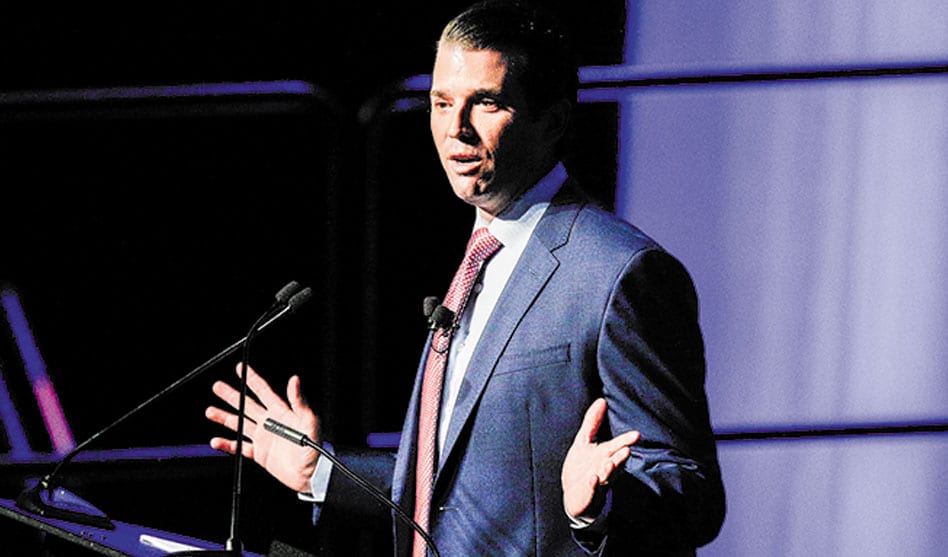In his 30-minute speech, Trump Jr. actually gave a few helpful insights into his father’s way of thinking
DAVID TAFFET | Senior Staff Writer
taffet@dallasvoice.com
Donald Trump Jr. spoke at AT&T Stadium in Arlington this week about freedom of speech. The press was barred from the event.
(Never mind that there’s a reason freedom of speech and freedom of the press are both included in the same amendment.)
So I was delighted when I received an invitation by email for a ticket. While other media outlets parked themselves at the entrance to the designated parking lot, we drove through. Security was surprisingly light — we went through a metal detector and only had to remove our cell phones from our pockets.
The event was the University of North Texas’ fall Kuehne Speaker Series lecture, funded by a school alum and corporate sponsorship, not university dollars. More than 100 faculty and staff wrote a letter to the president of the university protesting the selection of Trump as a speaker.
“This invitation evinces a stunning disrespect for women, people of color, LGBTQ members of our community, and others, and it cannot stand,” the letter began.
The group called on the university to suspend the series until administrators, faculty, staff and students become part of the speaker selection process in order to bring a more diverse spectrum of speakers. This year’s speakers range from the son of the president to a Fox News commentator. (One simple solution would be to just label the lectures a conservative speakers’ series and let liberal alums fund their own series.)
The UNT president began his introduction of Trump by complaining about “the fake news surrounding today’s lecture.” Or maybe he didn’t begin that way, because we learned during Trump’s speech that “the media always gets it wrong.”
Trump received a polite and quiet standing ovation at the beginning and end of his speech, but his jokes fell flat, and there were no applause lines during the talk. (Joke: “I’m from the People’s Republic of New York.”)
Trump didn’t actually focus on free speech as a main topic, except to complain about his own right to speak freely being impinged.
He began instead by explaining the election. He said he traveled to all the places his father didn’t, making lots of stops in smaller towns. People would come up to him and whisper that they were voting for his father.
Internal Trump campaign polling was 15 percent off national polls. He explained their method: Rather than asking the person who he or she was voting for, they asked who their neighbors were voting for. He said that people didn’t want to admit they were voting for his father but were honest about what they were hearing. They extrapolated that information, and it translated into Trump’s win.
The environment was “so toxic, people were afraid to say they were voting for my father,” he said.
Trump then explained our current position on the world stage: It’s Bush’s fault.
It’s Obama’s fault. “Foolishness” and “waste” are two words he used to describe their policies. Obama’s policies were as disastrous as Bush’s, he explained, and both wanted to export liberal imperialism. So his father’s administration came into office “with a ‘kick me’ sign on our back.”
He did give an explanation of his father’s foreign policy: Nationalism is good, and countries that stand up for their own interests will work together at times when it’s in their mutual interest.
“We will intervene to protect American lives and property, not to export American values,” Trump said.
Oh, and Benghazi.
He returned to the topic of the election and proved himself to be as much of a sore winner as his father. “People had enough of the media’s vitriol,” he said. “That’s why the polls were wrong.”
One interesting comment he made was there was “a lack of enthusiasm on the other side.” He may be right about that, at least from the point of undecided voters looking at both campaigns and deciding how to place their votes.
No one would have accused the 2008 Obama campaign of lacking enthusiasm.
That perceived lack of enthusiasm by people who either stayed home or voted for
Trump might have been the difference of a few thousand votes in a handful of states that would have delivered the necessary electoral votes to Clinton.
Trump completed his speech by talking about how colleges around the country make young people unemployable — not Texas colleges; the others, he assured his audience.
In a quest for diversity, he explained, schools recruit students who look different but all think the same — but not Texas schools. The others.
In addition to becoming unemployable, these students graduate feeling entitled to high-paying jobs and are saddled with huge debt. And students can’t declare bankruptcy on that debt. (Ah, bankruptcy. A Trump family value.)
During the question-and-answer session, Trump showed a little more personality. Asked about use of social media, he explained it’s served his father well: “It’s allowed him to say what he’s actually thinking,” he said. “Great tool for him. Incredibly effective.”
My take away? Since the media always gets it wrong, read the tweets.


What, nothing about how a lot of their money comes from Russians? Nothing about dear old dad being surprised to win despite his internal ‘polling?’ Nothing about being happy to accept help from foreign adversaries?
Ah, bankruptcy. A Trump family value